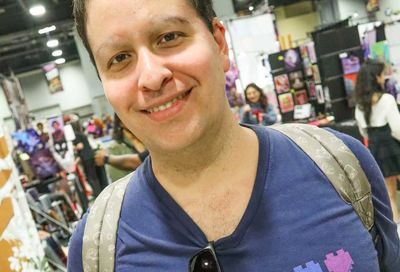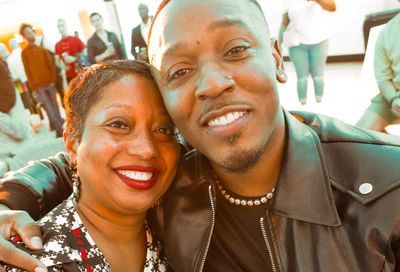A Spoonful of Speculation
Was P.L. Travers, the author of Mary Poppins, bisexual?

P.L. Travers, author of Mary Poppins, was born Helen Lyndon Goff on Aug. 9, 1899 in Queensland, Australia. She moved to England in 1924, and used the name P.L. Travers — an abbreviation of her pseudonym Pamela Lyndon Travers, which she used in her days as a dancer and Shakespearean actor on the Australian stage. Reportedly, her wealthy relatives did not approve of Travers performing, so, being independent-minded, she moved to England where she forged a career as a writer.
The name P.L. Travers appealed to Goff because it sounded more masculine — or at least, gender-nonspecific. Travers was the name of her father, an alcoholic banker whose career declined almost as quickly as he did (he died of tuberculosis at 43). His daughter was 7 years old when he passed.
The author, who first published poems as a teen in Australia, was fond of myths and fantasies. She constructed her own rather mysterious persona so that no one could really know her truth. Her famous literary heroine, based on an aunt of Travers’, was a magical nanny who helped her charges through difficult situations with sensible, even tough advice. Travers, who was very no-nonsense herself, was also fascinated with eastern philosophy and theosophy, Sufism and Hinduism.
In England, Travers lived with Madge Burnand, the daughter of the editor of Punch. The women shared a flat in London, and later rented a cottage together in Sussex. Much speculation has been made about whether they were lovers.
Actor Emma Thompson played Travers in the 2013 film Saving Mr. Banks, which depicted Travers’ battle with Walt Disney to make Mary Poppins. The actress spoke with The Advocate about Travers’ relationship with Burnand.
“I don’t know whether they were lovers or not,” she stated, “but she did live with Madge for a long, long time, and she certainly had very complex, passionate relationships with both women and men. She was an explorer of her own condition, and very possibly her own sexuality.”

It was while living with Burnand that Travers published Mary Poppins, the work that would give the author her greatest fame. Travers wrote five sequels and, as Saving Mr. Banks depicted, she reluctantly sold the rights to Disney. Travers, apparently, was not fond of the Julie Andrews/Dick Van Dyke musical and particularly hated the animated dancing penguins.
Few specifics about Travers’ sexual relationships have ever been detailed. Her diary recounted her friendship (and possibly a relationship) with Jessie Orage, whose husband, Alfred Richard Orage, was a pupil of the spiritual teacher G.I. Gurdjieff.
Travers became a follower of Gurdjieff, and through him became an occasional member of The Rope — a group that consisted mostly of lesbian writers, including Jane Heap, founding editor of Little Review, and Kathryn Hulme, author of The Nun’s Story.

Valerie Lawson, author of Mary Poppins, She Wrote, a biography of Travers, indicated that both Travers and Orage “loved men.” Their close friendship, Lawson indicates, was formed over the loss of Orage’s husband, and Travers’ editor, George William Russell.
Whether their friendship crossed over into a sexual relationship is not known. But Jim Korkis, a Disney historian, was quoted in the Orlando Weekly (around the time of Saving Mr. Banks) saying that, “It has been assumed that Travers was bisexual, although no one really knows for sure. She was known to be extremely flirtatious around younger men. At one point, she told an acquaintance that she thought that Walt [Disney] had ‘eyes’ for her.”
Travers certainly was secretive and private. It was perhaps a source of pride for her. New Statesman quotes her as saying, “I’m a private sort of person, as anonymous as possible — and that’s not humility.”
Other articles about the author that surfaced around the time Saving Mr. Banks was released have been even more candid. According to the Daily Mail, Travers was said to be “neither warm nor kindly. She was an intellectual snob who wrote erotic prose, was a one-time fascist sympathizer, occasional lesbian and appalling mother.”
Unpacking that quote, Travers is known to have written poetry for the erotic publication The Triad, and she wrote book reviews for New Pioneer, an anti-Semitic British magazine of the far right in the 1930. The article’s last point likely refers to the fact that, at age 40, Travers adopted a son, Camillus, who discovered he was a twin at age 17. Upon learning this — and that his twin grew up poor in Ireland — his relationship with Travers became strained.

It is entirely possible that Travers adopted Camillus so she would have someone to love. While she lived with Burnand, and was close to Orage, her rumored same-sex encounters may have happened without being disclosed. This is likely because Travers was alive (and prominent) during the era when women did not discuss relationships outside of marriage. Females in those days were expected to marry — if they lived together, there was always speculation about them being lovers. Moreover, if a woman lived alone, it was presumed she was likely promiscuous. Travers was certainly sharp enough — and discrete enough — not to let anyone know her true nature. For all anyone knows, she could have been asexual, given how little evidence there is of any lover(s).
But whether Travers was asexual, bisexual or something else entirely, it was certainly a taboo at the time for a woman to be intimately involved with other women. As Travers was gaining fame as a children’s author, the exposure of a same-sex relationship could have been especially harmful to her career. (Travers was made an Officer of the Order of the British Empire in 1977). This may account for why she felt she needed to maintain privacy.
Travers never published an autobiography. And while the news articles and biographies hint at what might have been, all anyone can really do is speculate.
Gary M. Kramer is an award-winning, Philadelphia-based film critic, author of Independent Queer Cinema: Reviews and Interviews and co-editor of Directory of World Cinema: Argentina.
Support Metro Weekly’s Journalism
These are challenging times for news organizations. And yet it’s crucial we stay active and provide vital resources and information to both our local readers and the world. So won’t you please take a moment and consider supporting Metro Weekly with a membership? For as little as $5 a month, you can help ensure Metro Weekly magazine and MetroWeekly.com remain free, viable resources as we provide the best, most diverse, culturally-resonant LGBTQ coverage in both the D.C. region and around the world. Memberships come with exclusive perks and discounts, your own personal digital delivery of each week’s magazine (and an archive), access to our Member's Lounge when it launches this fall, and exclusive members-only items like Metro Weekly Membership Mugs and Tote Bags! Check out all our membership levels here and please join us today!

























You must be logged in to post a comment.